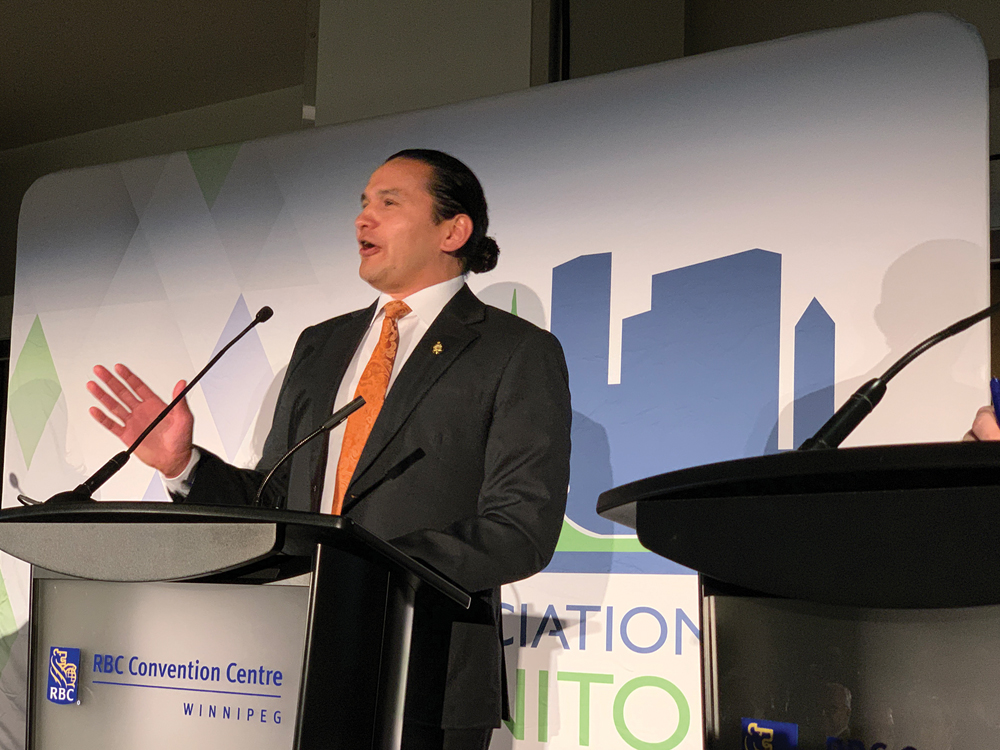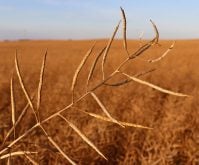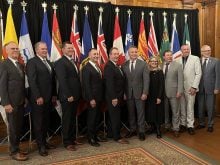After two terms of a Progressive Conservative government, the winds of political change have turned in favour of the NDP.
The party, led by now Premier-designate Wab Kinew, form Manitoba’s next provincial government following the Oct. 3 election.
The NDP won a majority government Oct. 3, although few of their 34 seats are outside of Winnipeg or Northern Manitoba.
Read Also

KAP flags risky trade for Manitoba farmers
Tariffs, market access uncertainty, trade diversification and export infrastructure top the agenda at Keystone Agricultural Producers (KAP) annual meeting.
Farm groups quickly responded to the results.
“I would also extend my sincere congratulations to Mr. Kinew not only for becoming Manitoba’s newest premier but for being the first First Nations person elected to this role,” said Keystone Agricultural Producers president Jill Verwey in a release.
“While there is always work to be done as we walk the path of reconciliation together, Mr. Kinew’s election should be seen by all Manitobans as a monumental moment in our history.”
Verwey’s reaction was echoed by Manitoba Beef Producers general manager Carson Callum.
“I want to congratulate the new premier-elect, Wab Kinew, for his victory and for being the first First Nations person to be elected in this role,” he said. “We look forward to working with him and all the MLAs.”
While the tone from Manitoba’s producer groups was positive, there’s a list of issues that those same organizations pushed during the election, some of which the NDP will be expected to uphold.
Rural-urban divide
The NDP continues to hold only tentative footholds in agricultural Manitoba.
The Dauphin riding flipped back to the NDP Oct. 3 – former Selinger-era ag minister Ron Kostyshyn narrowly defeated PC incumbent Gord Wood for the seat —but that was the only agricultural riding to do so.
The issue has long dogged the NDP and challenged its ability to fill the agriculture portfolio.
The party skirted that issue in the last term with its appointment of Diljeet Brar (re-elected Oct. 3 in the Maples riding) as agriculture critic. Brar, while from an urban riding, has an agriculture background and was formerly a Manitoba Agriculture extension specialist.
The NDP also took back Brandon East from the PCs Oct. 3, with Glen Simard defeating PC incumbent Len Isleifson. The PCs had held both of those seats since 2016.
Kinew made note of those inroads into traditional PC territory in his post-election speech.
“To people in rural Manitoba and to people in Northern Manitoba, I want to say thank you for sending people from your communities to sit with our team at the Manitoba legislature,” he said.
He also noted the lack of orange on the electoral map across the rest of rural Manitoba.
“I would ask you to keep an open mind,” he said, addressing rural residents who had not voted for his party. “And if our team delivers. If, after a few years, we have improved your health care and made your life a little more affordable, I would humbly ask that in four years time, you send more people from your communities to sit with our team in the Manitoba Legislature.”
The rural-urban divide is also a concern for producer groups, but Manitoba Pork Council general manager Cam Dahl said that’s not just a problem for the NDP.
“When we do see that kind of split, it becomes more difficult to understand each other’s story.”
Dahl said agriculture shouldn’t be seen as a specifically rural thing.
“It isn’t part of that urban-rural split. That’s something really important to be recognized. It’s not just an urban or rural issue. Agriculture is Manitoba.”
He said organizations like Manitoba Pork need to open dialogue with urban MLAs.
“It is always important to have those conversations about modern agriculture,” Dahl said. “We need to talk about the contributions that we’re making to the economy, to jobs, to building our communities and to environmental sustainability.”
Agricultural Crown lands
Agricultural Crown lands are expected to be an ongoing issue for the new government. In its campaign, the NDP promised to undo several changes the PCs put in place on Crown lands, most notably bringing back unit transfers.
In 2019, the province introduced regulatory changes to forage and grazing Crown lands that raised the hackles of existing lease holders. Besides higher rents, shorter leases, lack of land valuation mechanisms and other issues, one of the main irritants was elimination of the unit transfer. Leaseholders could no longer transfer the rights to their lease along with their deeded land when they sold their farms.
In an emailed statement, Brent Benson, president of the Manitoba Crown Lands Leaseholders Association, said the issue may have been enough to flip seats in the election.
“ACL changes were an important concern to voters in the constituencies with the largest concentrations of agricultural crown land,” he said. “With the outrage still fresh on producers minds, they were the difference in flipping the riding of Dauphin to the NDP.”
Benson said he appreciated the work done on the file by former Agriculture Minister Derek Johnson. Recent changes by the previous administration helped correct the mistakes made by predecessors, the producer said.
Still, Benson said he’s going to hold the NDP to its electoral promises.
“It’s essential that unit transfers be restored. That loss, as well as devastating rental rates, caused many young ranchers to give up,” he said. “We feel confident that the new government will keep their promise to fix these issues and work with producers going forward.”
Manitoba Beef Producers also noted the importance of establishing stability with the agricultural Crown lands after several years of tumult.
“The Crown lands file has seen instability for the last number of years,” said Callum.
Based on promises the NDP made during the campaign, he expects the dust hasn’t settled.
“We know the NDP made some commitments related to Crown lands and are going to try to adjust some of the changes that were implemented in 2019,” he said.
“We’re going to engage with the new government on our priorities as an organization and ensure that we can get some stability into the program and ensure that Crown lands can be an effective tool for producers to be able to raise cattle here in the province.”
Business as usual
For the most part, producer groups will pursue the same agendas as they did before the election.
For the beef producers, that means pushing for equitable business risk management programs for the cattle sector and recognition of the sector’s contributions to ecosystem sustainability.
“We are going to continue on our main mission,” said Callum. “We look forward to engaging with the incoming government and the various MLAs on a wide range of topics that we’ve been focused on for the last number of years.”
Dahl also pointed to issues around sustainability, saying he wants to ensure any policy changes and initiatives are based on sound science and that measures aren’t punitive.
“The carrot is always better than the stick,” he said. “Incentives for adopting new practices or new technologies are always going to be better than regulations that are punitive in nature.
“We want recognition of the contribution that modern agriculture has made to questions around environmental sustainability. We’ve come a long way.”
KAP also set five priority areas during the election campaign. General manager Brenna Mahoney said the organization will continue to push those issues with the incoming government.
“This election, our priorities were clear: remove the education property tax on farmland, pass right-to-repair laws for farm machinery, improve Manitoba’s infrastructure network, address labour shortages, and provide better healthcare and safety in rural areas,” said Mahoney.
“We look forward to engaging with Premier-elect Kinew and his entire team in the coming weeks to continue our discussions on these and other key issues affecting Manitoba producers.”
















